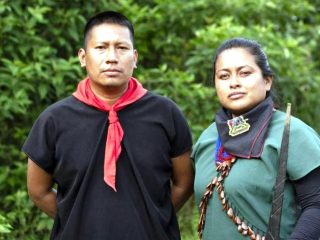Bolivia. CAM 5. Church On A Journey.
On the theme: “America on a Mission, the Gospel is joy”, the Fifth American Missionary Congress was held in Santa Cruz de la Sierra (Bolivia). A moment of encounter, of reflection on the challenges to be found in the society and Church of the American Continent today.
How can the Church strengthen its identity and missionary commitment in America that is being profoundly transformed from north to south? How can we proclaim the joy of the Gospel with particular attention to the peripheries of the world, at the service of a more just, a more sharing and fraternal world?
The icy wind blowing down from the Sierra did not prevent the 2,500 delegates from 24 American countries from facing and giving a courageous and effective response to the challenges to be found today in society and in the Church.
The Fifth American Missionary Congress (CAM 5) that was held in Santa Cruz de la Sierra (Bolivia) from 9 to 14 July 2018 had as its theme “America on a Mission, the Gospel is joy!” The Congress forms part of a long series of meetings that began in 1977 in Mexico with the First Latin American Congress (COMLA1). Since COMLA 6 which took place in Parana (Argentina) in 1999, it was re-named the American Missionary Congress (CAM), incorporating Canada and the United States. The last CAM was held at Maracaibo in Venezuela in 2013. The meeting is held every five years but always presents new challenges.
The four themes of the Congress: Gospel, Joy, Communion and Reconciliation and lastly Mission and Prophecy. The group work was carried out using the “see, judge and act” method. Two symbols: The “Missionary Cross”, that was carried in pilgrimage to in the different communities of the Americas to sustain the preparation of CAM 5, as well as the reliquary of Blessed Nazaria Ignacia March Mesa (1889 – 1943), foundress of the first religious congregation, started in Bolivia. Pope Francis will canonise her on 14 October next.
America divided
The peoples of the Americas live in a fragmented continent, divided and violent. As well as violence there is also poverty. According to CEPAL, extreme poverty in Latin America and the Caribbean increased from 8% in 2014 to 10% in 2016. At the same time, poverty increased from 28.5% in 2014 to 30.7% in 2016. Inequality of income (according to the Gini coefficient) changed from 0.538 in 2002 to 0.467 in 2016. Latin America is the most unequal region of the world. A January 2018 OXFAM report showed that, in Latin America, 10% of the richest hold 68% of all wealth.
Corruption within many governments has a great impact on the region. A case in point in Brazil is that of “Lava Jato” that uncovered a network of corruption and financing in local electoral campaigns. A single Brazilian company, Odebrecht, was involved in illicit financing in more than ten countries in Latin America and two in Africa.
In the view of Transparency International, the Latin American region is considered among the most corrupt in the world. Today the international organisation shows that various democracies are going through difficult times at institutional and social level and in the exercise of power.
Other serious factors in the region are drug-trafficking, human trafficking and the question of immigration. The Bolivian Jesuit Sergio Montes points out how all this violence, inequality and poverty is taking place in a continent with a Catholic majority. He insists that, in a sometimes discouraging situation, the Church is called to “knock down walls, build bridges, reconcile people, bind up wounds and repair what is damaged”. “We can do it”, he says, “If we feel co-responsible for how the society lives where we proclaim the Kingdom of God which starts here and now” through the presentation of the Gospel witnessed above all “by our participation in the life of others, going out from ourselves to meet them truly”. Father Sergio Montes presents three missionary challenges. The urgency of an ecological challenge “which must create a new relationship between creation and God. We are called to be in charge of our Common Home. The destinies of the earth and of the poor are intimately linked”, he says. This requires communion in Christian communities, teamwork and collaboration. Then there is the challenge of many situations of conflict, violence and corruption. The missionary community must be “outgoing”, it must leave much of its security and comfort and “join a complex world where action and concrete commitment are required”.
Witnesses to Joy
Salome’ Mamani Hilari smiles captivatingly in her traditional Aymara costume. She is a member of the community radio team and is responsible for the pastoral programmes. She tells us: “Joy, the theme of the Congress, has kept us busy during these years of preparation. Each week I prepared a programme to try to explain the meaning of the joy of the Gospel. We are going through very sensitive times. I believe that speaking of the joy of the Gospel gives us a feeling of hope. Our indigenous communities give great importance to the word joy. Our Indian culture does not make us sad”.
Bishop Guido Charbonneau of the Honduran diocese of Choluteca, said in his initial conference that, in order to present the Gospel with joy and passion, it is necessary “to communicate with joy our encounter with the Risen Lord “which fills us with contagious joy that leads to conversion. “ Our peoples cannot hide their sadness”, they feel “humiliated, frustrated, tired of so many broken promises”. But in the encounter with Jesus they discover “the deep meaning of the scriptures and this fills them with interior fire” and, together with it, “the passionate joy of the Gospel”. Their joy is uncontainable and also comes from the Beatitudes that also indicate a path of holiness and help to find the strength to face experiences of suffering.
Regarding the proclamation of the Gospel to the world of today, Mons. Santiago Silva Retamales, president of the Episcopal Conference of Chile, intervened on how to be witnesses to communion and reconciliation. “The missionary – the bishop stressed – is born of the empty tomb and is a witness to the Risen Christ; he belongs to the Kingdom and is a new person, assumes a new identity, ‘he is Christified’ and assumes the identity of Christ both as an individual and a community, with all this implies in radical life choices”.
“Today more than ever – Mons Silva concludes – the Gospel needs to be interpreted and actualised in order to give meaningful answers to the contemporary world”.
Mons. Luis Augusto Castro Q., Archbishop of Tunja in Colombia, underlined, among other things, the need for the prophet to combat idolatry, both against the rivals of God that make take different forms: power, uncontrolled capitalism, idolatry of race, etc., and also against the temptation to manipulate God, a god made in our own image and likeness. Comboni Mons. Vittorino Girardi, Bishop Emeritus of Tilaran-Liberia in Costa Rica, spoke of the ‘ad gentes’ mission within and beyond America. His was a purely missionary intervention, underlining the need for the continental church to open itself up to the ad gentes mission since, in the words of Pope Francis, “evangelising activity is the paradigm of every work of the Church. Its missionary nature is the paradigm of every work of the Church”. Mons. Girardi added that “in the American continent, we have ample room for mission” and, by way of provocation, he further added that “an American-Indian Church, a Church of the indigenous peoples, has yet to be born”.
A prophetic mission
In the CAM 5 conclusions we find “We are aware of the great, rapid and profound changes that are shaking culture and society in the postmodern era […] Among these challenges, our Church is especially concerned with the following phenomena in our continent: the crisis of the family with all its problems, contempt and violence against life and human dignity, the violation of human rights, the economic dominion of the few which creates unemployment and poverty, the panorama of injustice and the lack of solidarity that neglects the human person in this age of secularism, the need to take care of Mother Earth, the worrying situation of inequality and violence to which women are subjected, the indigenous population, the darker aspects of the Church itself, stricken especially by sex-abuse scandals, the decline in priestly vocations, weak and relativist modernity with its inherent negativity and immorality”.
The document also contains some proposals such as: encouraging the communion of goods in the Church and with the poor; work for a missionary Church that is more ministerial and lay. “On this is based the emblematic proposal for the creation of a recognised ministry, lay or female, through which the extraordinary service of women to evangelisation as a living reality”; finally, to promote awareness of the prophetic and liberating mission in all social environments. “We therefore support the creation of the American Ecclesiastical Observatory for Human Rights for the purpose of making prophetic reports on situations of exclusion, marginalisation, oppression, injustice, corruption and the abuse of human, social, political and economic rights in all countries of America”.
It was a feast of colours, music, joy and, especially, informal encounters. However, the various reflection groups emphasised more than once the Congress lacked the sharing of many missionary experiences in which Latin America is so rich. During the conferences, those who intervened were, (but for one priest,) all bishops. It would have been interesting to hear the voices of the laity in order to reflect an image of a Synodic Church in which all walk together, where all listen and all speak. The next Missionary Congress will be held in Puerto Rico in 2023. (C.C.)



